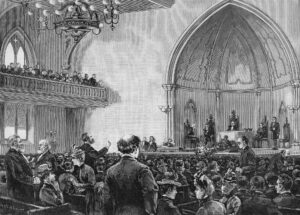Over the course of 2021, I slowly worked my way through Letters of John Newton. Some of us may know that name, and if not the name, most of us will know the lyrics he penned in the song Amazing Grace.
As the near year begins, I would like to encourage you to read the Letters of John Newton. Here are three reasons I would commend the letters of this brother of old to you.
You Will Find Hope for Sufferers
As a human being liven in a fallen world, and as a pastor, John Newton was no stranger to suffering. Consider this sample of his reflections on the realities of the challenges we often experience:
“What a mercy it is to know that all is in safe hands; that sickness and health, comfort or affliction, life or death, are all equally in the inventory of a believer’s privileges,- all equally blessings, though some in one view are more apparently so, and some are sent more under a disguise to do us good; so that, perhaps, we are afraid of them, and would willingly, if we could, prevent them from coming; but they are the Lord’s messengers, they have a gracious errand to deliver, and therefore they must have admittance; and though at first we do not like their looks or their language, yet afterwards, when we have received the benefits, the peaceable fruits of righteousness they were commissioned to bestow, we are not sorry they were sent, or that we were not able to shut them out.”
You Will Find Help for Sinners
As a justified sinner in the midst of his own sanctification, as all in Christ are in this world, Newton was also no stranger to the realities of indwelling sin. Consider the encouragement he gives here to press on in light of the grace and mercy of God:
“You must not expect habits and tempers will be eradicated instantaneously; but by perseverance in prayer, and observation upon the experiences of every day, much may be done in time. Now and then you will (as is usual in the course of war) lose a battle; but be not discouraged, but rally your forces, and return to the fight. There is a comfortable word, a leaf of the tree of life, for healing the wounds we receive, in 1 John 2:1.
If the enemy surprises you, and your heart smites you, do not stand astonished as if there were no help, nor give way to sorrow, as if there were no hope, nor attempt to heal yourself; but away immediately to the throne of grace, to the great Physician, to the compassionate High Priest, and tell him all.
Satan knows, that if he can keep us from confession, our wounds will rankle; but you do profit by David’s experience (Psalm 32:3-5). When we are simple and open-hearted in abasing ourselves before the Lord, though we have acted foolishly and ungrateful, he will seldom let us remain long without affording us a sense of his compassion; for He is gracious; He knows our frame, and how to bear with us, though we can hardly bear with ourselves, or with one another.”
You Will Find Wisdom for Life’s Situations
Though Newton’s life spanned from 1725-to 1807, some of the specific situations he addressed sometimes have as much relevance today as in his own, which comes as a pleasant surprise to us. Consider this longer excerpt, which is charitable, balanced, and saturated with Newton’s theology of God’s sovereignty and providence:
“It seems I must write something about the smallpox…I am not a professed advocate for inoculation [vaccination]; but if a person who fears the Lord should tell me,
I think I can do it in faith, looking upon it as a salutary expedient, which he in his providence has discovered, and which therefore appears my duty to have recourse to, so that my mind does not hesitate with respect to the lawfulness, nor am I anxious about the event; being satisfied, that whether I live or die, I am in the path which I can cheerfully expect his blessing;
I do not know that I could offer a word by way of dissuasion.”
In other words, Newton can understand a situation where faith in God’s providence and sovereignty would lead someone towards vaccination. On the other hand, Newton can also understand a situation where faith in God’s providence and sovereignty would lead someone to not be vaccinated:
“If another person should say,
My times are in the Lord’s hands; I am now in health, and am not willing to bring upon myself a disorder, the consequences of which I cannot possibly foresee. If I am to have the small-pox, I believe he is the best judge of the season and manner in which I shall be visited, so as may be most for his glory and my own good; and there I choose to wait his appointment, and not to rush upon even the possibility of danger without a call. If the very hairs of my head are numbered, I have no reason to fear that, supposing I receive the smallpox in a natural way, I shall have a single pimple more than he sees expedient; and why should I wish to have one less?
Nay, admitting, which however is not always the case, that inoculation might exempt me from some pain and inconvenience, and lessen the apparent danger, might it not likewise, upon that very account, prevent my receiving some of those sweet consolations which I humbly hope my gracious Lord would afford me, if it were his pleasure to call me to a sharp trial…Besides, at the best, inoculation would only secure me from one of the innumerable natural evils the flesh is heir to.
I should still be as liable as I am at present to a putrid fever, a bilious cholic, and inflammation in the bowels, or in the brain, and a thousand formidable diseases which are hovering round me, and only wait his permission to cut me off in a few days or hours. And therefore I am determined, by his grace, to resign myself to his disposal. Let me fall into the hands of the Lord (for his mercies are great), and not into the hands of men.”
To this, Newton responds: “If a person should talk to me in this strain, most certainly I could not say, ‘Notwithstanding all of this, your safest way is to be inoculated.'”
In summary, Newton concluded that no blame could be laid at the feet of those who “neither run intentionally into the way of the small-pox, nor run out of the way, but leave it simply with the Lord.”
So whether faced with suffering, which is inevitable, or sin, which is constant, or the need of wisdom for various situations, which is daily, brothers and sisters from the past can help us. This is eminently so in John Newton’s letters, and so I commend you to take them up and read!
























